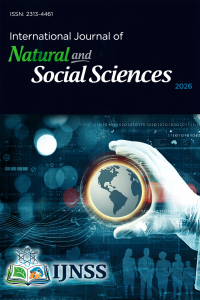Research, Review and Clinical Articles
Buffalo rearing and production system in Bangladesh: Problems and prospects |
|||||
| Authors: Pramanik MAH, Rawshan-E-Jannat M, Rahman MM and Khatun MT; Pages: 01-07 [showhide type=”V12I3-01″ more_text=”Show Abstract” less_text=”Hide Abstract“]
Md. Ahsan Habib Pramanik1 1Department of Livestock Services, Dhaka, Bangladesh
Buffalo farming in Bangladesh holds significant untapped potential for enhancing rural livelihoods and contributing to national food security. Despite their economic importance, current buffalo production remains low, primarily due to limitations in nutrition, breeding, health management, infrastructure, farmer education, and environmental adaptability. The production system is predominantly extensive and traditional, characterized by low productivity and inefficient resource utilization. Although initiatives to promote semi-intensive and intensive systems are underway, widespread adoption is hindered by poor feeding practices, limited access to artificial insemination (AI), inadequate veterinary services, and lack of organized marketing. Feeding systems largely depend on low-quality roughages, with minimal supplementation, leading to suboptimal milk and meat yields. Improvement in feeding and nutrition management, including the adoption of intensive systems and balanced rations, requires enhanced farmer training and accessible extension services. Similarly, reproductive performance remains poor due to reliance on natural mating, late maturity, and low conception rates. The development of AI infrastructure, estrus detection technologies, and genetic improvement programs is essential for reproductive efficiency. Health and disease management also face serious challenges due to insufficient vaccination coverage, limited veterinary outreach, and dependence on traditional practices. To unlock the full potential of buffalo farming, an integrated strategy involving scientific interventions such as climate-resilient practices, modern breeding, balanced feeding, cooperative marketing, and policy-driven support is imperative. With targeted investment and coordinated efforts from government agencies, research institutions, and farming communities, buffalo production in Bangladesh can be transformed into a commercially viable and sustainable livestock sub-sector. Keywords: Buffalo, Rearing, Production, Bangladesh.
How to cite this article: Pramanik MAH, Rawshan-E-Jannat M, Rahman MM and Khatun MT (2025). Buffalo rearing and production system in Bangladesh: Problems and prospects. International Journal of Natural and Social Sciences, 12(3): 01-07. DOI: 10.5281/zenodo.17115203. [/showhide] |
Effects of hot water blanching and storage time on the quality of refrigerated pineapple (Ananas comosus) slices |
|||||
| Authors: Pramanik MAH, Rawshan-E-Jannat M, Rahman MM and Khatun MT; Pages: 08-18 [showhide type=”V12I3-02″ more_text=”Show Abstract” less_text=”Hide Abstract“]
Maraj Miah1 1Department of Food Engineering and Technology, Bangladesh Agricultural University, Mymensingh, 2202, Bangladesh
This research was conducted to evaluate the effects of blanching and storage days on physico-chemical, sensory, and microbial qualities of pineapple slices. The pineapples (Honey Queen) were cut into circular identical slices and refrigerated at 5°C for 0, 4, 8 and 12 days after exposing to hot water blanching at 0, 70, 85 and 100°C for 1 minutes. The changes in physico-chemical parameters, such as total soluble solids (TSS), color factors, titratable acidity (TA), pH, vitamin C, total phenolic content (TPC), along with the sensory attributes and microbial count (total plate count, total coliform count, total yeast and moulds count, and Salmonella) of pineapples were investigated. The control sample shelf life (16 days) was maximum. We found that blanching and storage days had significant effect on physico-chemical properties, microbial load, and sensory attributes of pineapples. Findings also showed that declining trend in pH and a simultaneous rise in TA in samples throughout the storage period. The TSS was increased with the increase of blanching temperature and storage days. Vitamin C contents in pineapple slices showed a reducing trend by both blanching and during storage. The increase of blanching temperature increased the total phenolic content compared to control samples but decreased with the advancement of storage days. Irrespective of the blanching treatments, color factors (L, a, and b value) showed a declining trend during storage. In sensory evaluation, control samples obtain the highest score and denoted as “like moderately”. Blanching had effectively reduced the overall microbial load of pineapples slices compared to controls. The control samples gave the better vit-c retention as well as the sensory quality of pineapples slices but poor microbial safety. The hot water blanched pineapple are microbial hygienic and safe for consumption, but showed lower shelf life. Keywords: Pineapple, blanching, storage time, physico-chemical properties, microbial load, shelf life.
How to cite this article: Miah M, Alim MA, Karmoker P, Khan MM and Rafi IA (2025). Effects of hot water blanching and storage time on the quality of refrigerated pineapple (Ananas comosus) slices. International Journal of Natural and Social Sciences, 12(3): 08-18. DOI: 10.5281/zenodo.17636354 [/showhide] |
